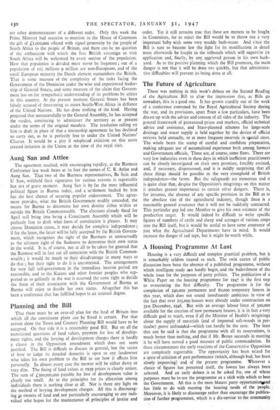Planning and the Bill
That there must be an over-all plan for the land of Britain into which all the constituent plans can be fitted is certain. For that reason alone the Town and Country Planning Bill would have to be accepted. On that side it is a reasonably good Bill. But on all the transitional questions of land values, payment for loss of develop- ment rights, and the levying of development charges there is hardly a clause in the Opposition amendment which does not seem justified. The Bill is difficult to discuss in general, but the secret of how to judge its detailed demerits is open to any landowner who takes his own problem to the Bill to see how it affects him personally. In almost every case the answer will be either dusty or very dim. The fixing of land values at 1939 prices is clearly unjust. The sum of ,C300,000,000 payable for loss of development value is clearly too small. As to the principles for its allocation among individuals there is nothing clear at all. Nor is there any light on the method of levying development charges. All this is discourag- ing Lo owners of land and not particularly encouraging to any indi- vidual whd hopes for the maintenance of principles of justice and order. Yet it still remains true that these are matters to be fought in Committee, for to reject the Bill would be to throw out a very important baby with some very muddy bath-water. And since the Bill is sure to become law the fight for its modification in detail must afterwards be fought in the tribunals which will supervise its application and, finally, by any, aggrieved person in his own back- yard. As to the positive planning which the Bill promotes, the main danger is not that it will be done too quickly, but that administra- tive difficulties will prevent its being done at all.


































 Previous page
Previous page